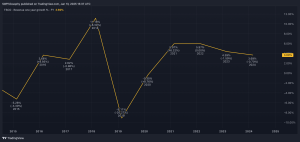BT (LSE: BT.A) shares have been shockingly volatile in recent years and that’s rolled over in 2025. They’ve slumped 10% in the last month.
They’re still up 18% over 12 months and we can’t really blame BT itself for the latest dip. Instead, that’s down to interest rate expectations.
Markets hoped for a string of rate cuts this year. But as inflation proves sticky, we may just get one or two.
Is this FTSE 100 stock a brilliant bargain?
As well as squeezing economic growth, that makes high-yielding stocks less attractive. Today, BT has a trailing yield of 5.78%.
That’s fabulous, but as with any stock there’s a spot of risk involved. And when investors can get more than 4% from cash or bonds, without putting their capital on the line, they’re less inclined to take that risk. All investments are relative.
Yet history shows that stocks and shares deliver a superior return to cash and bonds over the longer run. And by a long chalk. So moments like these can be a brilliant buying opportunity for far-sighted investors to consider.
As well as locking into that higher yield, BT’s lower valuation gives a margin of safety. Plus plenty of rewards if the share price recovers.
If stock analysts are right, it might recover at speed. Last week, I noted that the 13 analysts offering one-year share price forecasts for BT predict the shares would grow 37% over the next 12 months.
That’s now climbed to a blockbuster 45%. If correct, that would lift BT share price from 138p to more than 200p.
Throw in the forecast yield of 5.5%, and we’re looking at a total return of more than 50%. Which is way more than any savings account or bond would return. But is that forecast too good to be true?
One issue is that these forecasts were made before the recent dip and don’t reflect changed interest rate expectations. So what about the company itself?
It’s a stunning source of income
Newish CEO Allison Kirkby is besieged by long-standing challenges such as falling revenues from fixed-line services, the fallout from the costly foray into sports broadcasting and the group’s massive pension deficit.
She also has to make the group’s massive £15bn investment in its Openreach full-fibre services rollout pay. Last year she said BT had passed the “inflection point” where the rewards can start to flow.
As demand for faster and more reliable internet continues to grow, BT’s extensive network could become a significant revenue driver. Yet BT also has to hang on to customers who are being lured away by smaller, nimble and often cheaper alt-net broadband suppliers.
Kirkby plans to cut 42% of the company’s 130,000-strong workforce by the end of the decade. That’s ambitious, relies on AI and must be having a strange impact on morale. I wonder if she’ll manage it.
Trading at just 7.75 times earnings, BT looks really cheap. However, telecoms is a competitive sector and the shares are more of a gamble than I fancy taking right now. Brave investors willing to chase a potential outsized return may feel differently.
This post was originally published on Motley Fool







